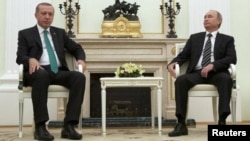Turkish President Recep Tayyip Erdogan, angered by Russia’s bombing campaign in Syria, warned Moscow on Thursday that Ankara may look elsewhere for partners to supply natural gas and build its first nuclear power plant.
One of the top importers of Russian gas, Turkey has joined with Moscow in a major effort to construct a new gas pipeline – dubbed Turkish Stream, or TurkStream – as an alternate route into Europe that bypasses Ukraine.
Russia is also slated to build Turkey's first nuclear power plant in Akkuyu on the Mediterranean coast, a controversial $20 billion project aimed at improving its energy self-sufficiency.
But Erdogan told reporters as he flew to Japan Thursday that such cooperation was at risk due to Moscow’s bombing of Syria and violations of Turkish airspace.
"We are a number one consumer of Russian natural gas. If necessary, Turkey can take its gas from many other different places," he said.
On the nuclear deal, signed in 2013 but as yet without a start date, Erdogan said losing Turkey would entail significant losses for Russia.
“Others can build the Akkuyu plant if the Russians don't," he said.
Raising tension
NATO member Turkey is furious over Russia’s air campaign in Syria to prop up the government of President Bashar al-Assad, whom Ankara wants ousted.
Turkey summoned Russia's ambassador for a second time earlier this week following multiple reports of airspace violations by Russian military jets along the Turkish-Syria border.
Turkish officials have reportedly threatened to shoot down Russian warplanes if they cross the border again. Russia said the incursions were accidental.
“The tension between Russia and Turkey is serious,” said Erdal Tanas Karagol, an analyst at the SETA Foundation, an Ankara-based think tank.
“While no one wants to lose a mutually beneficial relationship, Turkey cannot ignore Russia’s steps in Syria,” he said.
Yet beyond protesting, there may not be much Turkey can do.
“A lot of what Erdogan’s saying is bluster,” said Gareth Jenkins, a senior fellow at the Central Asia-Caucasus Institute, a transatlantic research and policy center affiliated with Johns Hopkins University's School of Advanced International Studies in Washington.
“We’ve seen before that Russia and Turkey have compartmentalized their relationship. They have deep economic ties. The current tensions will blow over,” he said.
Pipeline delayed
In another possible sign of the fallout over Russia’s actions in Syria, the Russian gas giant Gazprom announced Wednesday that the Turkish Stream project would be delayed.
"Given that there is no intergovernmental agreement, the timeframe will be postponed," Russian news agencies quoted Gazprom deputy CEO Alexander Medvedev as saying, referring to a deadline next year for building the first of four pipelines underneath the Black Sea.
"How long it is postponed depends on when the agreement gets signed. If the deadline is pushed back by a year, that won't be a tragedy," he added.
Russian President Vladimir Putin announced the plan for Turkish Stream in December 2014, saying it would replace Russia's now scrapped South Stream joint venture with EU companies.
Putin and Erdogan agreed last month – before Russia's bombing campaign in Syria – that work on the project would continue despite the difficulties.
But construction of the pipeline – previously scheduled to start in June – has still not begun.
Its scale also has been greatly reduced, with Gazprom saying Tuesday it would slash TurkStream’s capacity from 63 billion cubic meters per year to 32 bcm.
It is Turkey that will pay the higher price if it loses Russia as a supplier, Jenkins said, adding that the pipeline's primary driver is Brussels, not Ankara.
“If the project is to go forward, there must be an appetite for Russian gas in Europe,” he said. “The two key factors are a concern about over-dependence on Russia as a source and political tensions over Ukraine and Syria.”
Turkey does have other major suppliers if the current animosity with Russia deepens further – Azerbaijan and Iran, with smaller amounts planned from Turkmenistan.
But "Turkey’s long-term aim is to become an energy hub, passing on gas exports to the European market so it can collect transit fees," Jenkins said. “Similar tensions in the past have blown over.”





